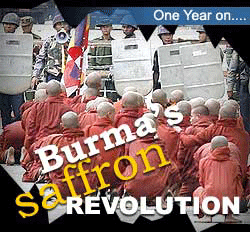Winds of change fail to stir Myanmar
– by James Rose, The New Straits Times, Sept 30, 2008
New York, USA —
 Last September, peaceful demonstrations let the world know that the people of Myanmar had enough of the crushing oppression of the military junta, yet, today, exactly one year later, Myanmar still languishes in a haze of terror and deprivation.
Last September, peaceful demonstrations let the world know that the people of Myanmar had enough of the crushing oppression of the military junta, yet, today, exactly one year later, Myanmar still languishes in a haze of terror and deprivation.
Another year goes by and those monks who are left after the military cracked down after the demonstration are contemplating huge risks once again because the world just didn’t get it last time.
If Myanmar is a part of the global family, it is perhaps its most neglected, like a child cast away simply because it was mugged by some bullies and has been held hostage by them ever since. As with most situations of this kind, ostracisation is as much the story of the ostraciser as the ostracised.
It certainly doesn’t make sense to ignore the people. Most risk their lives daily in keeping the Saffron Revolution alive and in trying to get the message to the world, they need help.
Led by the community of monks in this devoutly Buddhist country, known as the Sangha, a network of activism has firmed throughout the country since last September. Monks have boycotted the military and continue to thwart their attempts to crush the country’s spiritual soul. The military have been largely cut off from the Buddhist clergy and the monks have openly campaigned for an international arms embargo as a means of taking the tools of oppression away from their oppressors.
The Sangha provided the aid and accommodation services the military refused to give to some 70 per cent of homeless survivors from May’s Cyclone Nargis in Yangon and around the Irrawaddy delta.
This is a case of the civil overwhelming the political; of citizens and their spiritual leaders, not their political leaders, taking up the slack left neglected by the government.
Perhaps this is why the community of nations finds it difficult to respond more firmly in Myanmar — notions of state sovereignty run deep and tend to undermine many of the good souls who would dearly love to effect positive change in a much-maligned country. A flavour of this was seen in the immediate aftermath of Nargis, as civil aid groups found it more or less impossible to deliver aid over and around an unwilling state government.
Perhaps this is why the global community and its more influential members refuse to demand the release of some 2,000 political prisoners in the country, including Nobel Peace Prize laureate Aung San Suu Kyi; nor find the will to dam the arms flowing in from Russia and China.
Perhaps this is why the world will not act even as the military backbone to the ruling junta bends and weakens under the force of its own people clamouring for an end to the nightmare.
Structural shifts and widespread dissatisfaction among the ranks, including regular desertions, are enfeebling an already untenable organisation, yet still no one moves to show the generals the door.
The country continues to win all the sort of awards no one wants to win. It has the largest number of child soldiers anywhere in the world, many fighting the world’s longest running civil war; it is the world’s most corrupt country; and it has probably the world’s highest military spending as a percentage of budgetary funds (40 per cent). It has Asia’s second-highest child mortality rate and is the third-largest source of refugees in the world.
This in a country with the 10th largest natural gas reserves in the world and in an economy which, despite much resource wealth remaining untapped, receives some US$150 million (RM500 million) per month in energy export revenues alone.
One year on from the Saffron Revolution, the world is highly distracted by an economic crisis largely of its own making. As the graphs and stock charts trend downwards, attention is justifiably on the family home, keeping one’s job and hoping the whole shooting match doesn’t come and end up with blood everywhere.
But this isn’t the time to get caught up in our own crises. This is an opportunity to extend crisis thinking outwards. It is a time to remember that even as the world reels, there are those in Myanmar, as in Sudan, Tibet, North Korea, Chad, Zimbabwe, Western Sahara and elsewhere, who need some crisis thinking of their own. In dealing with the economic crisis, let’s use that energy and fix-it thinking to extend to other areas.
One year after the Saffron Revolution offers a moment to lift the long-suffering people of Myanmar.
The writer is adviser to the Burma Fund, the policy think-tank of the New York-based National Coalition Government for the Union of Burma
– Source : James Rose, The New Straits Times




